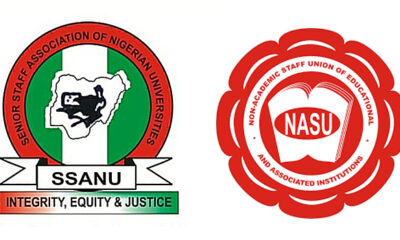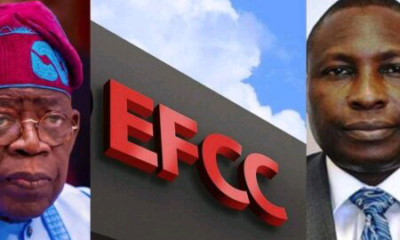
The Federal High Court, Ado-Ekiti has ordered the Economic and Financial Crimes Commission and Zenith Bank Plc to show cause why an ex parte order to de-freeze Governor Ayodele Fayose’s accounts as submitted to the court by the governor’s legal team should not be upheld.
Justice Taiwo Taiwo fixed July 4 for the EFCC and Zenith Bank Plc to appear in court to justify the freezing of Fayose’s accounts.
Mike Ozekhome (SAN) had through an ex parte order deposed to on June 24, 2016 by Bimpe Olatemiju sought a mandatory order unfreezing the accounts belonging to and operated by him pending the determination of his interlocutory application.
Joined in the suit are the EFCC (1st defendant) and Zenith bank (2nd defendant).
The order was supported by an 18-paragraph affidavit, a lone exhibit, which was a letter issued to Governor Fayose by Zenith Bank confirming that the EFCC actually placed a restriction order on the accounts and a written address.
He also sought the leave of the court for the service of the originating summons on the defendants in their various addresses outside the jurisdiction of the court as contained on the order papers, supported by a 17-paragraph affidavit.
Ozekhome said the order was brought pursuant to Order 26 rule 8(1) of the Federal High Court Civil Procedure Rule 2009 and Section 44(1) of the 1999 Constitution, which gives the court the discretionary powers to adjudicate on such matter.
Citing the case of Abdulaziz Nyako Vs EFCC to buttress his position that the anti-graft agency has no power to freeze Fayose’s account without a valid court order, Ozekhome added the action was a flagrant negation of the Section 308 of the constitution, which conferred absolute immunity on the governor against civil and criminal procedures.
He said it was appalling that the EFCC could play ostrich to these valid constitutional requirements and took cognizance of the African Charters on Human and People’s Rights before taking the “punitive” stand against Fayose, adding that these infractions had rendered the action unconstitutional, wrongful, null and void.
Delivering his ruling, Justice Taiwo said he understood that the applicant (Fayose) enjoys immunity and that the court can adjudicate on this matter as canvassed by the counsel to the plaintiff, but he pointed out that the relief he basically sought was a mandatory order of the court .
He said: “I quite agree that the applicant has immunity pursuant to provisions of the constitution, but it is glaring that the application he is requesting for is a mandatory order to undo what had already been done and the court can’t abdicate its duty under this circumstance.
“I am of the opinion that this mandatory order is better granted with the interlocutory order being sought through an application pending before the court, because the applicant has filed all papers to this effect.
“I hereby order the 1st and 2nd respondents to appear before this honourable court on July 4, 2016 and show cause why the order should be refused.
“This is not a refusal of the order.
“I have not refused it, but I only put it in abeyance, which I said without prejudice to what will be the position of the respondents.
“But a leave is granted for the service of the defendants with the originating summons in their respective addresses as contained on the order papers.”
Describing the presiding judge as being at home with the law and a highly experience lawyer, Ozekhome said told newsmen: “Our motion was an exparte for the de-freezing and removal of restriction placed on citizen Ayodele Fayose’s two accounts with the Zenith Bank Plc.
“The bank claimed through a letter made available to our client that it acted on the instructions of the EFCC and we are here by way of originating summons to say that the EFCC has no powers, whether under the EFCC Act, money laundering Act, under the constitution or any other known law to freeze the accounts of a sitting governor who enjoys immunity under section 308 of the Constitution of Federal Republic of Nigeria, 1999, as altered, because that section makes it clear that for the time that person is in that office, the President, Vice-President, Governor and Deputy Governor, he enjoys absolute immunity from any civil or criminal procedure and that no court process can issue against such person.
“So, EFCC could not have obtained an order ex parte to freeze his account.
“If they did that, it is illegal, null and void.
“It could also not have frozen his accounts without having an order ex parte.”
Asked what would be the the legal team’s next step should the EFCC fail to honour the court’s order on Monday, Ozekhome said the government agency cannot dare a Federal High Court’s order.

 BIG STORY5 days ago
BIG STORY5 days ago
 BIG STORY21 hours ago
BIG STORY21 hours ago
 BIG STORY19 hours ago
BIG STORY19 hours ago
 BIG STORY4 days ago
BIG STORY4 days ago
 BIG STORY4 days ago
BIG STORY4 days ago
 BIG STORY3 days ago
BIG STORY3 days ago
 BIG STORY3 days ago
BIG STORY3 days ago
 BIG STORY4 days ago
BIG STORY4 days ago
























